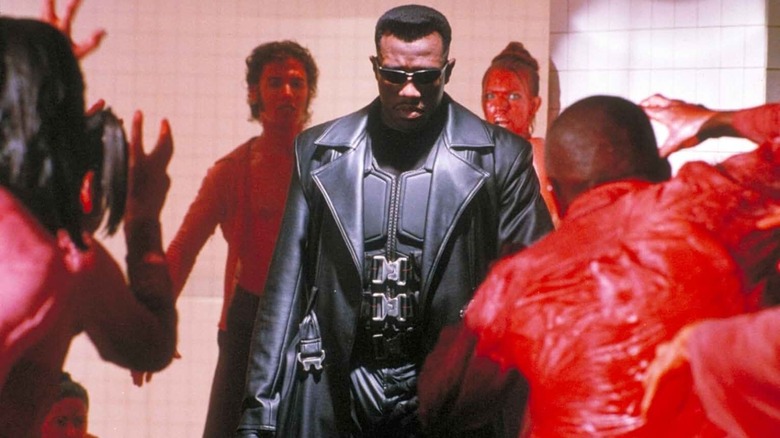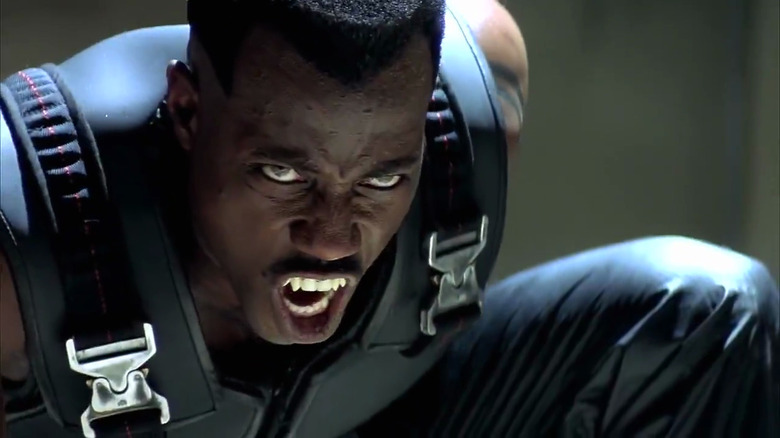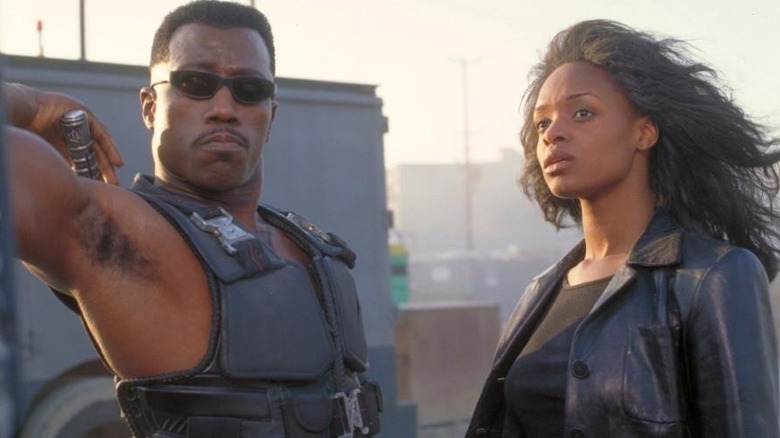How Marvel Cheated Themselves Out Of The Profits From Blade
Comic book fans in the late 1990s likely recall the ambitious plan by Artisan Entertainment, a then-rising indie film studio, to make a long series of mid-budget films based on Marvel superheroes. Avi Arad, then the CEO of Marvel Entertainment, had overseen a deal that would allow Artisan to make movies with Black Panther, Thor, Deadpool, Ant-Man, Iron Fist, and Morbius, as well as Power Pack, Longshot, and an irreverent dark comedy about Mort the Dead Teenager. The deal was finalized in 2000. In 2003, however, Artisan was acquired by Lionsgate, effectively ending what would have been the ambitiously planned early-2000s mid-budget version of the Marvel Cinematic Universe.
Despite how successful Disney's MCU would become a decade later, Marvel was once considered a non-viable source of film revenue. Indeed, while comic book sales were up across the board in the 1990s, Marvel was struggling to make their characters more visible in the marketplace. Superheroes, judging by the Artisan deal, could be bought for a song.
But interest was clearly growing. A few years before the Artisan deal, in 1998, Marvel proved to be profitable with the release of New Line Cinema's "Blade," an R-rated, techno-inflected, ultra-cool superhero movie about a vampire hunter (Wesley Snipes). "Blade," directed by Steven Norrington, was made for a not-immodest $45 million and would gross over $131 million worldwide. It was an unexpected hit, and many see the success of "Blade" as the earliest proof that superheroes were not a waste of money, two years before "X-Men" solidified their box office potential in 2000.
In the new book "MCU: The Reign of Marvel Studios" – written by Joanna Robinson, Dave Gonzales, and Gavin Edwards — "Blade" producer Peter Frankfurt, revealed that Marvel didn't predict that. The company took an up-front price on "Blade," rather than sign up for profits based on success. Marvel ultimately made about $20,000.
'I think Marvel was paid $25,000'
Peter Frankfurt recalls that Marvel's movie game was in the midst of shifting around when "Blade" was being made. When they sold a character to a film studio, it seems Marvel was happy to settle for a low initial payment, rather than wait to see if a movie would be profitable. There were no toy deals, no tie-in merch, and a run-of-the-mill ad campaign. This wasn't an investment for the comics giant. Frankfurt said:
"Marvel as a movie-making entity was inconsequential, and it was during the course of making 'Blade' that the ownership changed. [...] Avi Arad kind of arrived on the scene. He really had nothing to do with the first Blade. I think Marvel was paid $25,000 — that was what their upside on 'Blade' happening was. That all happened before I even got involved; that was the deal that New Line made with Marvel. [Marvel] didn't think that it was worth anything."
"Blade," however, was widely embraced by fans who dug its steely aesthetic and lead actor. Snipes clearly loved playing Blade, as he even gave interviews while in character. The film was a modest hit when it opened, taking everyone by surprise, including Frankfurt. He said:
"'Blade' was a weird oddity. [...] It came out the second weekend of 'Saving Private Ryan'; it knocked 'Saving Private Ryan' out of first place. Everyone was like, 'What is that thing? Is it a horror movie? Is it a superhero movie? Is it a vampire movie? Is it a kung fu movie?' No one could figure it out, which is exactly what we had wanted to do, a total genre-bender."
Some of Marvel's other characters were already farmed out. The company took notice and tried to get on the bandwagon a little more.
The line to Spider-Man
"Blade," incidentally, is a fine film. While the special effects aren't entirely refined, and the black-leather fashion is certainly dated, the action is fun, the character is a badass, and the mythology is intriguing. Blade is a half-vampire swordfighter who has sworn to kill all vampires in the world. It seems that vampires run the world from the shadows, and vast, complicated operating networks in big cities ensure that they remain secret from the human world. Stephen Dorff played the vicious vampire villain Deacon Frost, and the film co-starred N'Bushe Wright, Donal Logue, and Kris Kristofferson. Udo Kier also plays a vampire CEO.
The "MCU" book points out that Marvel, having sold off the rights to Spider-Man years earlier, was eager to get involved in their movie projects again. Bryan Singer's 2000 film "X-Men" was already in the works, but their Artisan deal was proof that Marvel wanted to expand, even if it was for little money. Back in 1985, Marvel sold the rights to Spider-Man to the Cannon Group, a studio often celebrated for its low-budget genre pictures. Cannon handled "Superman IV: The Quest for Peace" and "Masters of the Universe." They once released a trailer for their Spider-Man film, to be directed by Joseph Zito. ("Friday the 13th: The Final Chapter"). When Cannon went bankrupt in 1990, Spider-Man was picked up by Carolco.
It wouldn't be until 2002 that Sam Raimi's "Spider-Man" would hit theaters, as it wouldn't get a serious push until 1998, when "Blade" made unexpected profits. When "Spider-Man" was a hit, superheroes became big business. Only six years later, "Iron Man" hit theaters, and the MCU would begin a decade-and-a-half of box office dominance.
All because of the little vampire movie that could.


